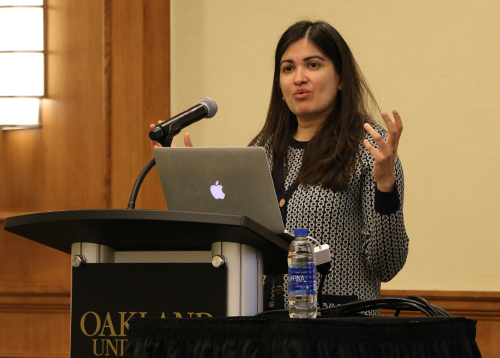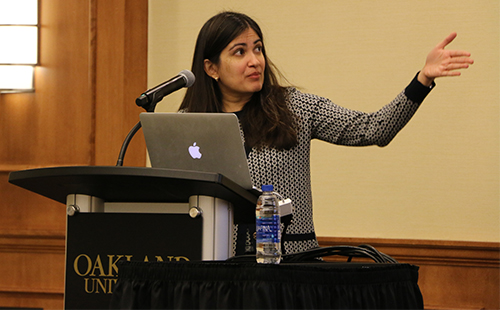
Medical professionals need to address gender inequity the same way they take on diseases and other issues, according to a prominent radiologist who spoke this week at Oakland University.
“Me Too Comes to Medicine: Transforming the Culture” was presented by Reshma Jagsi, M.D., deputy chair of radiation oncology, Newman Family Professor of Radiation Oncology, residency program director, and director of the Center for Bioethics and Social Sciences, University of Michigan Hospital. Oakland University William Beaumont School of Medicine sponsored the presentation.
In fact, Jagsi was invited by OUWB Stephan Sharf Interim Dean Duane Mezwa, M.D., as he knew the message was an important one.
“I’ve listened to her presentation three times and have been equally moved each time I’ve heard her speak,” said Mezwa. “It’s a powerful presentation that needs to be heard by as many medical professionals as possible.”
After her presentation, Jagsi said the purpose is to help as many people as possible feel “a sense of empowerment and that we can actually address (inequity), just like a health care quality program — that we can gather data, and measure, and intervene, and continue innovating and evaluating in the same way that we do when we’re fighting disease.”
Curing inequity
According to the American Association of Medial Colleges (AAMC), women have made up almost half of graduating medical students since 2004, and represent just 35 percent of active physicians. Female physicians make 76 cents and female scientists make 90 cents for every dollar earned by men, even after adjusting for age, years of experience, and specialty. Fewer than 20 percent of medical school deans and department chairs are women.
Just this week, the AAMC issued a statement and call to action on gender equity — the very same issue Jagsi said creates a culture that leads to other problems like sexual harassment, and has led to cultural movements such as #MeToo and #TimesUp.
That’s why Jagsi said it’s important for her and others who engage in research on the topic of equity in medicine to get out and share their findings with others “to help motivate the change that’s needed.”
“Sometimes you can get a sense that these problems are just too big to address — ‘How are we going to deal with the fact that society has gendered expectations for the division of domestic labor?’ Or ‘How are we going to address something intractable as sexual harassment?’ Or ‘How are we going to begin to address hostility or discrimination?’” said Jagsi.
“We become disheartened and we start to feel like this is too big and unmanageable,” she continued. “We are mostly doctors…and I think if we think we can cure cancer, we can cure inequity, too.”
In her presentation at Oakland University, Jagsi drew largely from the vast amount of research she has done on topics related to gender inequity during the last decade (see end of story for links to her studies she cited).
In introducing the problem, Jagsi noted that until 1972, less than 10 percent of the medical student body were women. That changed when Title IX of the Education Amendments of 1972 were enacted and schools were effectively barred from discriminating against women.
 Last year, for the first time ever, the number of women made up the majority of students in medical schools, according to AAMC.
Last year, for the first time ever, the number of women made up the majority of students in medical schools, according to AAMC.
Despite the change, Jagsi stressed that women do not share equally in power and authority in the field of medicine, thereby creating an environment that can lead to gender inequity, harassment, and more.
“There are differential challenges that women face including unconscious biases, gendered expectations of society, and overt discrimination and harassment that we must target and remedy if we seek to access the full talent pool and the demonstrated benefits of diversity.”
Addressing challenges
Jagsi’s presentation addressed ways that organizations can work toward solutions.
One way is to conduct what she identified as “site-specific interventions.” She said that means an organization specifically looks at where incidents of alleged discrimination, harassment, or any other types of offenses occur, what the incidents involve in terms of action taken by the accused perpetrator, and as many other variables as possible.
“We need to understand that to improve the system,” she said. “We have to change the very culture that is allowing these behaviors to occur.”
She noted another benefit to conducting such interventions.
“We demonstrate our commitment to eradicating this behavior,” she said.
Jagsi also called for organizations to have clear policies, and facilitate easier reporting of offenses.
“Right now, at most academic medical centers, it is a horribly complicated, bizarre system,” she said.
In stating that “equity is essential," Jagsi also called for organizations to employ, promote, and integrate more women into every level of the operation. The goal should be to have a workplace where women and men equally share power and authority.
Other tools identified by Jagsi to build equity include use of mentoring programs specifically for women, promoting work-life integration, evidence-based implicit bias training, and “transparent and consistent criterion-based evaluation, promotion, and compensation processes.”
And, she said, right now is the time to “move from awareness to action,” which is why she welcomed the opportunity to bring that message to Oakland University and OUWB.
“It’s a tremendous privilege to have the opportunity to speak to a group as diverse and engaged in medical education as the audience today,” said Jagsi. “It speaks volumes to me when a dean cares enough about this issue to invite a speaker and convene a symposium like this.”
Throughout her presentation, Jagsi referred to several papers she has authored or co-authored. They are:
• Sex Differences in Attainment of Independent Funding by Career Development Awardees, Annals of Internal Medicine, 2009.
• Gender Difference in the Salaries of Physician Researchers, The Journal of American Medical Association, 2012.
• Gender Differences in Time Spent on Parenting and Domestic Responsibilities by High-Achieving Young Physician-Researchers, Annals of Internal Medicine, 2014.
• Patterns of Work-Related Burnout in Physician-Scientists Receiving Career Development Awards from the National Institutes of Health, JAMA Internal Medicine, 2020.
• Diving Beneath the Surface: Addressing Gender Inequities Among Clinical Investigators, The Journal of Clinical Investigation, 2019.
• Sexual Harassment and Discrimination Experiences of Academic Medical Faculty, The Journal of American Medical Association, 2016
• Sexual Harassment in Medicine — #MeToo, The New England Journal of Medicine, 2018.
• What Can Medicine Learn from Social Scientific Studies of Harassment?, Annals of Internal Medicine, 2018
• #MedToo: A Large-Scale Examination of the Incidence and Impact of Sexual Harassment of Physicians and Other Faculty at an Academic Medical Center, Journal of Women’s Health, 2020.
• Unplugging the Pipeline — A Call for Term Limits in Academic Medicine, The New England Journal of Medicine, 2019.
• Parenting During Graduate Medical Training — Practical Policy Solutions to Promote Change, The New England Journal of Medicine, 2019.
• Social Media and Gender Equity in Oncology, JAMA Oncology, 2019
• From #MeToo to #TimesUp in Health Care: Can a Culture of Accountability End Inequity and Harassment?, The Lancet, 2019.
Additionally, a version of the PowerPoint presentation shown by Jagsi during her visit to Oakland University can be found at https://www.med.upenn.edu/focus//user_documents/PennFocusJagsi.pdf
For more information, contact Andrew Dietderich, marketing writer, OUWB, at [email protected].

